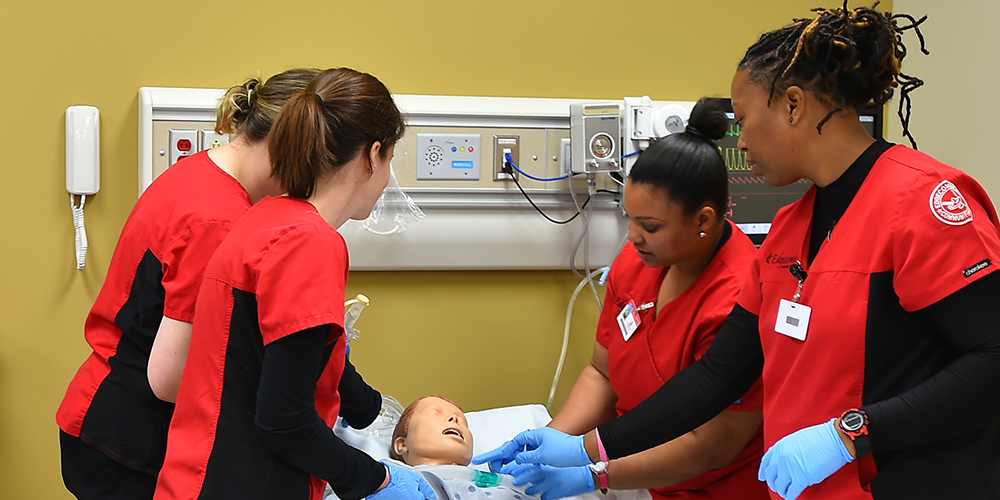ECC Receives Cannon Foundation Grant to Strengthen Training in Emergency Medicine

Edgecombe Community College nursing students assess and treat a patient simulator. The Cannon Foundation recently awarded $63,000 to the college to purchase a human trauma patient simulator that will be used primarily in first responder training.
A new high-tech patient simulator will give health care students at Edgecombe Community College exposure to emergency medicine, thanks to a recent $63,000 grant from The Cannon Foundation.
Before students become nurses, paramedics, or EMTs, they need exposure to realistic crisis situations. But students don’t have access to victims of gunshot wounds or head injuries.
That’s where Trauma Hal comes in. Trauma Hal is a human trauma patient simulator for teaching medical care on the battlefield.
ECC expects to take delivery of a Trauma Hal simulator in mid-November.
“We’re really delighted,” says Robin Pigg, dean of the Division of Health Sciences at ECC.
“We’ve been using realistic patient simulators for years now, but they were not sturdy enough to move them around a lot or to put them on the ground to simulate a patient thrown from a car, for example.”
Health care students at Edgecombe Community College have been working with simulation manikins since 2010. The lifelike manikins can be programmed by instructors to imitate many symptoms of acute conditions, and they enable students to analyze and react to emergency situations without endangering real patients.
Trauma Hal is the newest in a line of patient simulators from the Miami-based Gaumard Scientific Co. Its rugged and resilient design withstands extreme hot and cold temperatures and wet and dry conditions.
Like the Hal simulators that came before him, Trauma Hal can mimic realistic injuries. It can bleed and breathe; its blinking eyes can react to light; and it has a heartbeat, blood pressure, and detectable oxygen saturation – all programmable from a nearby laptop. Trauma Hal can even speak to let students know what kind of pain it is experiencing.
Trauma Hal will be used in the college’s mobile health lab, known as the HealthCare Simulator, and students and instructors will have more flexibility in their training without fear of damaging the manikin.
The Cannon Foundation is part of the philanthropic legacy of Charles Cannon, former president and chairman of Cannon Mills Company. The foundation has been awarding grants for more than 50 years – chiefly in North Carolina and primarily in the fields of health care, higher education, human services, and community.
Edgecombe Community College applied for the grant in June, and Pigg received word in September that The Cannon Foundation approved the request.
“We are very grateful to The Cannon Foundation for their generous support,” says Pigg. “Trauma Hal will help us do a better job of training our paramedic and EMS students in particular, which will benefit health care in our region.”
